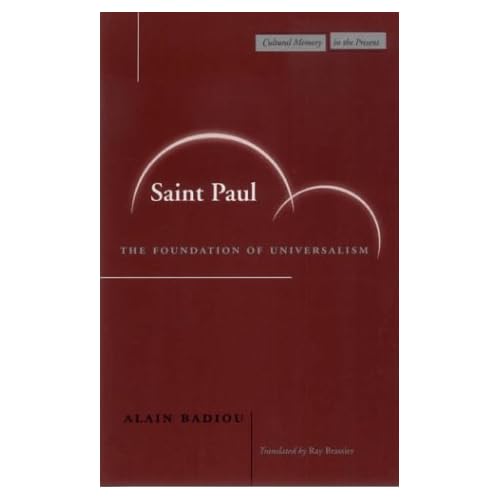 This Sunday I will be preaching on Acts 17, the well known passage of Paul's encounter with the philosophers in Athens. In preparation I thought I would finally read Badiou's book on Saint Paul and see how Paul faired with this philosopher. Badiou has been receiving fairly good press among many theologians and biblical scholars. There is certainly significant insight gleaned throughout. Badiou states in the Prologue that he cares "nothing for the Good News he declares." But then comes the statement that sets the tone for the entire work, "But he is subjective figure of primary importance." Badiou is looking to configure a contemporary subject from the example of Saint Paul; or to use his own words, "to refound a theory of the Subject that subordinates its existence to the aleatory dimension of the event as well as to the pure contingency of multiple-being without sacrificing the theme of freedom." For Paul the entirety of his project consists in the statement "Christ is resurrected". It is this event that allows Paul to level or demolish all communitarian difference. Identity and law become founded in an event that while have a historical site is founded on no historical or cultural narrative. It is owned by no people but is for all people. It is universal.
This Sunday I will be preaching on Acts 17, the well known passage of Paul's encounter with the philosophers in Athens. In preparation I thought I would finally read Badiou's book on Saint Paul and see how Paul faired with this philosopher. Badiou has been receiving fairly good press among many theologians and biblical scholars. There is certainly significant insight gleaned throughout. Badiou states in the Prologue that he cares "nothing for the Good News he declares." But then comes the statement that sets the tone for the entire work, "But he is subjective figure of primary importance." Badiou is looking to configure a contemporary subject from the example of Saint Paul; or to use his own words, "to refound a theory of the Subject that subordinates its existence to the aleatory dimension of the event as well as to the pure contingency of multiple-being without sacrificing the theme of freedom." For Paul the entirety of his project consists in the statement "Christ is resurrected". It is this event that allows Paul to level or demolish all communitarian difference. Identity and law become founded in an event that while have a historical site is founded on no historical or cultural narrative. It is owned by no people but is for all people. It is universal.
Badiou summarizes Paul's procedure;
if there has been an event, and if truth consists in declaring it and then in being faithful to ti this declaration, two consequences ensue. First, since truth is evental, or of the order of what occurs, it is singular. It is neither structural, nor axiomatic, nor legal. No available generality can account for it, nor structure the subject who claims to follow in its wake. Consequently, there can be a law of truth. Second, truth being inscribed on the basis of a declaration that is in essence subjective, no preconstituted subset can support it; nothing communitarian or historically established can lend its substance to the process of truth. Truth is diagonal relative to every communitarian subset; it neither claims authority from, nor (this is obviously the most delicate point) constitutes any identity. It is offered to all, or addressed to everyone, without a condition of belonging being able to limit this offer, or this address.
This leads Badiou to offer four maxims of the truth as universal singularity as it applies to Paul and to our contemporary context.
1. The Subject does not preexist the event and thus the extrinsic conditions of his existence or identity will be argued against (i.e. neither Jew nor Greek, slave nor free, male nor female).
2. Truth is entirely subjective and therefore under no law.
3. Fidelity to the declaration is essential, for truth is a process, and not an illumination. This process requires the presence of faith (or conviction) at the point of declaration, love as its militant address and hope (or certainty) as the force understanding the completion of the truth.
4. A truth is of itself indifferent to the state of the situation. This requires a distance for the State and from what corresponds to the State in people's consciousness: the apparatus of opinion. One must not argue about opinions, Paul says.
Okay I should actually get to work now, more later.

1 comment:
Hi nicce reading your blog
Post a Comment